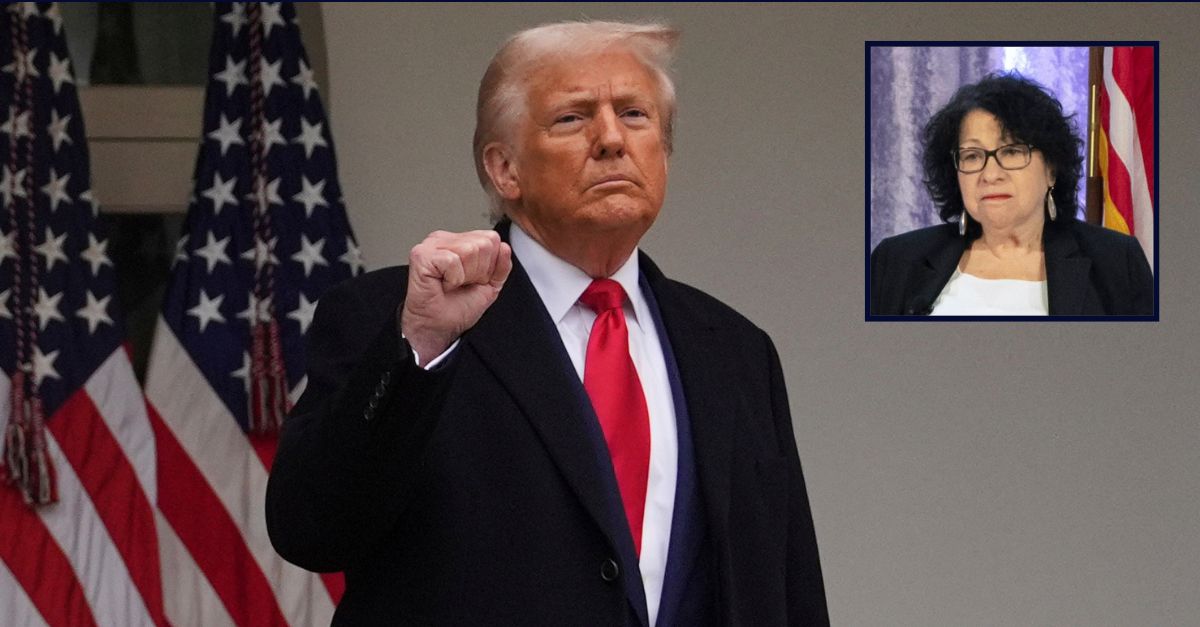
Main: President Donald Trump departs after signing an executive order at an event to announce new tariffs in the Rose Garden of the White House, Wednesday, April 2, 2025, in Washington (AP Photo/Evan Vucci). Inset: Supreme Court Justice Sonia Sotomayor speaks with retired U.S. Appeals Court Judge Thomas Griffith, not shown, during a panel discussion at the winter meeting of the National Governors Association, Feb. 23, 2024 in Washington (AP Photo/Mark Schiefelbein).
The U.S. Supreme Court on Monday evening interceded in what is likely the most high-profile legal challenge of President Donald Trump’s second term, vacating a lower court order that halted the federal government from deporting Venezuelan migrants under an 18th century wartime power without meaningful legal recourse.
While the justices’ intervention does provide a respite from the cascading defeats suffered by Trump’s Justice Department over the last three months, the court’s 5-4 decision also effectively put a stop to the administration’s initial method of sending alleged gang members to El Salvador without legal proceedings. The majority held that migrants deported under the Alien Enemies Act of 1798 are entitled to notice and due process.
“‘It is well established that the Fifth Amendment entitles aliens to due process of law’ in the context of removal proceedings,” the order states. “So, the detainees are entitled to notice and opportunity to be heard ‘appropriate to the nature of the case.’ More specifically, in this context, AEA detainees must receive notice after the date of this order that they are subject to removal under the Act. The notice must be afforded within a reasonable time and in such a manner as will allow them to actually seek habeas relief in the proper venue before such removal occurs.”
Habeas corpus cases — ones in which defendants attack the legality of their custody — are required to be filed where the individual is being detained, in this case Texas rather than Washington, D.C., where the initial lawsuit was brought.
While the ruling was a mixed bag for both sides, Justice Sonia Sotomayor penned a scathing dissent in which she said the court’s decision was “as inexplicable as it is dangerous.”
The most senior liberal justice on the court called out her colleagues for allowing the Trump administration to resume deportations under the AEA — despite the government’s own admission that at least one migrant who had protected legal status in the U.S. was taken and deported to one of the most notorious work prisons in the world.
“The Government takes the position that, even when it makes a mistake, it cannot retrieve individuals from the Salvadoran prisons to which it has sent them,” she wrote. “The implication of the Government’s position is that not only noncitizens but also United States citizens could be taken off the streets, forced onto planes, and confined to foreign prisons with no opportunity for redress if judicial review is denied unlawfully before removal. History is no stranger to such lawless regimes, but this Nation’s system of laws is designed to prevent, not enable, their rise.”
The Barack Obama appointee was joined in full by the other two justices appointed by Democrats, Elena Kagan and Ketanji Brown Jackson, and in part by Trump appointee Justice Amy Coney Barrett.
Sotomayor emphasized that the Trump administration had repeatedly exhibited “noncompliance” with court orders and “ignored its obligations to the rule of law” by “hustling” migrants onto deportation flights in what she referred to as a “covert operation” designed to avoid judicial review.
“That the District Court is engaged in a sincere inquiry into whether the Government willfully violated its March 15, 2025, order to turn around the planes should be reason enough to doubt that the Government appears before this Court with clean hands,” the justice wrote. “That is all the more true because the Government has persistently stonewalled the District Court’s efforts to find out whether the Government in fact flouted its express order. The Government’s conduct in this litigation poses an extraordinary threat to the rule of law. That a majority of this Court now rewards the Government for its behavior with discretionary equitable relief is indefensible. We, as a Nation and a court of law, should be better than this.”
Jackson also wrote a dissent criticizing her colleagues for their early intervention in the case, saying the “fly-by-night approach to the work of the Supreme Court” was “not only misguided,” but also “dangerous.”
“I lament that the Court appears to have embarked on a new era of procedural variability, and that it has done so in such a casual, inequitable, and, in my view, inappropriate manner,” she wrote. “With more and more of our most significant rulings taking place in the shadows of our emergency docket, today’s Court leaves less and less of a trace. But make no mistake: We are just as wrong now as we have been in the past, with similarly devastating consequences. It just seems we are now less willing to face it.”
Love true crime? Sign up for our newsletter, The Law&Crime Docket, to get the latest real-life crime stories delivered right to your inbox.








